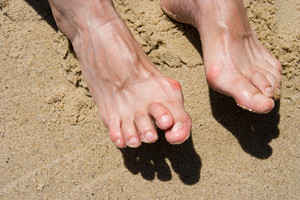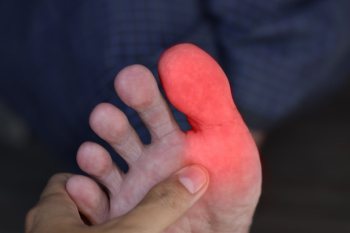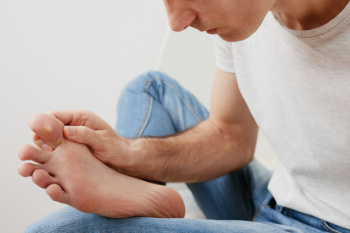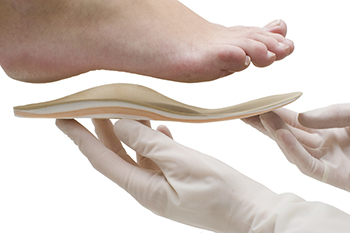






Hammertoe is a foot deformity where one or more of the smaller toes bend abnormally at the middle joint, resembling a hammer. This condition often results from an imbalance in the muscles, tendons, or ligaments that normally keep the toe straight. Common causes can include wearing ill-fitting shoes, especially those that are too tight or have high heels, which force the toe into a bent position. Other contributing factors include genetic predisposition, arthritis, and trauma to the toe. Symptoms of hammertoe include pain or irritation on the affected toe, especially when wearing shoes, as well as corns or calluses forming on the top of the joint due to friction. The affected toe may also become red, swollen, or stiff. Early detection is essential for effective treatment, which may involve changing footwear, using orthotic devices, and performing toe exercises. If you have developed a hammertoe, it is suggested that you consult a podiatrist who can offer you effective treatment options, which may include surgery for severe cases that can relieve pain and correct the deformity.
Hammertoes can be a painful condition to live with. For more information, contact one of our podiatrists of Active Foot and Ankle Care, LLC. Our doctors will answer any of your foot- and ankle-related questions.
Hammertoe
Hammertoe is a foot deformity that occurs due to an imbalance in the muscles, tendons, or ligaments that normally hold the toe straight. It can be caused by the type of shoes you wear, your foot structure, trauma, and certain disease processes.
Symptoms
Risk Factors
Treatment
If you have hammertoe, you should change into a more comfortable shoe that provides enough room for your toes. Exercises such as picking up marbles may strengthen and stretch your toe muscles. Nevertheless, it is important to seek assistance from a podiatrist in order to determine the severity of your hammertoe and see which treatment option will work best for you.
If you have any questions, please feel free to contact our offices located in Fair Lawn, Riverdale, and Englewood, NJ . We offer the newest diagnostic and treatment technologies for all your foot care needs.

Toe numbness and tingling, often described as a pins-and-needles sensation, can arise from various causes. Commonly, it results from poor circulation, nerve compression, or injury. Prolonged pressure on the nerves, such as from wearing tight shoes or sitting in one position for too long, can lead to temporary numbness. Medical conditions like diabetes, peripheral neuropathy, or multiple sclerosis can also cause these symptoms. Additionally, deficiencies in vitamins such as B12, or mineral imbalances, may contribute to nerve problems. Recognizing the underlying cause is essential for effective treatment. If numbness and tingling persist or are accompanied by other symptoms, like pain or muscle weakness, it is important to seek medical advice from a podiatrist. If you have these sensations in your feet or toes, it is suggested that you visit this foot doctor for a diagnosis and treatment.
Toe pain can disrupt your daily activities. If you have any concerns, contact one of our podiatrists of Active Foot and Ankle Care, LLC. Our doctors can provide the care you need to keep you pain-free and on your feet.
What Causes Toe Pain?
Most severe toe pain is caused due to a sports injury, trauma from dropping something heavy on the toe, or bumping into something rigid. Other problems can develop over time for various reasons.
Toe pain can be caused by one or more ailments. The most common include:
When to See a Podiatrist
Diagnosis
In many cases the cause of toe pain is obvious, but in others, a podiatrist may want to use more advanced methods to determine the problem. These can range from simple visual inspections and sensation tests to X-rays and MRI scans. Prior medical history, family medical history, and any recent physical traumatic events will all be taken into consideration for a proper diagnosis.
Treatment
Treatments for toe pain and injuries vary and may include shoe inserts, padding, taping, medicines, injections, and in some cases, surgery. If you believe that you have broken a toe, please see a podiatrist as soon as possible.
If you have any questions please feel free to contact our offices located in Fair Lawn, Riverdale, and Englewood, NJ . We offer the newest diagnostic tools and technology to treat your foot and ankle needs.
 Plantar warts are small growths that appear on the soles of the feet, caused by the human papillomavirus, or HPV. They often develop in weight-bearing areas, such as the heels or balls of the feet, leading to discomfort or pain while walking. Plantar warts typically show up as rough, grainy bumps with black pinpoints, which are clotted blood vessels and may be surrounded by hardened skin. Treatment options include salicylic acid treatments, cryotherapy, or freezing, and prescription medications. In persistent cases, a podiatrist may perform minor surgical procedures to remove the wart. Diagnosis involves a visual examination and, occasionally, a biopsy to rule out other skin conditions. Recovery time varies depending on the treatment method, but keeping the area clean and avoiding pressure on the wart can aid healing. Do not attempt to cut or pick at the wart, as this can spread the virus or cause infection. If you believe you have a plantar wart, it is suggested that you schedule an appointment with a podiatrist for an accurate diagnosis and effective treatment.
Plantar warts are small growths that appear on the soles of the feet, caused by the human papillomavirus, or HPV. They often develop in weight-bearing areas, such as the heels or balls of the feet, leading to discomfort or pain while walking. Plantar warts typically show up as rough, grainy bumps with black pinpoints, which are clotted blood vessels and may be surrounded by hardened skin. Treatment options include salicylic acid treatments, cryotherapy, or freezing, and prescription medications. In persistent cases, a podiatrist may perform minor surgical procedures to remove the wart. Diagnosis involves a visual examination and, occasionally, a biopsy to rule out other skin conditions. Recovery time varies depending on the treatment method, but keeping the area clean and avoiding pressure on the wart can aid healing. Do not attempt to cut or pick at the wart, as this can spread the virus or cause infection. If you believe you have a plantar wart, it is suggested that you schedule an appointment with a podiatrist for an accurate diagnosis and effective treatment.
Plantar warts can be very uncomfortable. If you need your feet checked, contact one of our podiatrists from Active Foot and Ankle Care, LLC. Our doctors will assist you with all of your foot and ankle needs.
About Plantar Warts
Plantar warts are the result of HPV, or human papillomavirus, getting into open wounds on the feet. They are mostly found on the heels or balls of the feet.
While plantar warts are generally harmless, those experiencing excessive pain or those suffering from diabetes or a compromised immune system require immediate medical care. Plantar warts are easily diagnosed, usually through scraping off a bit of rough skin or by getting a biopsy.
Symptoms
Treatment
To help prevent developing plantar warts, avoid walking barefoot over abrasive surfaces that can cause cuts or wounds for HPV to get into. Avoiding direct contact with other warts, as well as not picking or rubbing existing warts, can help prevent the further spread of plantar warts. However, if you think you have developed plantar warts, speak to your podiatrist. He or she can diagnose the warts on your feet and recommend the appropriate treatment options.
If you have any questions please feel free to contact our offices located in Fair Lawn, Riverdale, and Englewood, NJ . We offer the newest diagnostic and treatment technologies for all your foot and ankle needs.
 Orthotics are available in various types, each designed to address specific foot issues and provide optimal support. The five most common types of orthotics are functional or rigid, soft or accommodative, orthotics for fragile feet, orthotics for sensitive feet, and sports-specific orthotics. Functional or rigid orthotics are made from firm materials like plastic or carbon fiber, and they correct abnormal foot motion, providing stability and relieving pain in the legs, thighs, and lower back. Soft or accommodative orthotics are crafted from cushioned materials to absorb shock and alleviate pressure, making them ideal for individuals with diabetes or arthritis. Orthotics for fragile feet are designed for those with weakened or compromised foot structures, offering gentle support and protection. Sensitive orthotics cater to those with hypersensitive feet, providing comfort without irritation. Additionally, sports-specific orthotics are tailored for athletes, enhancing performance by improving alignment and reducing the risk of injury. Custom-made orthotics are the best option, as they fit an individual's unique foot structure and needs. Schedule an appointment with a podiatrist for an assessment of your condition and a recommendation for a suitable orthotic type for you.
Orthotics are available in various types, each designed to address specific foot issues and provide optimal support. The five most common types of orthotics are functional or rigid, soft or accommodative, orthotics for fragile feet, orthotics for sensitive feet, and sports-specific orthotics. Functional or rigid orthotics are made from firm materials like plastic or carbon fiber, and they correct abnormal foot motion, providing stability and relieving pain in the legs, thighs, and lower back. Soft or accommodative orthotics are crafted from cushioned materials to absorb shock and alleviate pressure, making them ideal for individuals with diabetes or arthritis. Orthotics for fragile feet are designed for those with weakened or compromised foot structures, offering gentle support and protection. Sensitive orthotics cater to those with hypersensitive feet, providing comfort without irritation. Additionally, sports-specific orthotics are tailored for athletes, enhancing performance by improving alignment and reducing the risk of injury. Custom-made orthotics are the best option, as they fit an individual's unique foot structure and needs. Schedule an appointment with a podiatrist for an assessment of your condition and a recommendation for a suitable orthotic type for you.
If you are having discomfort in your feet and would like to try orthotics, contact one of our podiatrists from Active Foot and Ankle Care, LLC. Our doctors can provide the care you need to keep you pain-free and on your feet.
What Are Orthotics?
Orthotics are inserts you can place into your shoes to help with a variety of foot problems such as flat feet or foot pain. Orthotics provide relief and comfort for minor foot and heel pain but can’t correct serious biomechanical problems in your feet.
Over-the-Counter Inserts
Orthotics come in a wide variety of over-the-counter inserts that are used to treat foot pain, heel pain, and minor problems. For example, arch supports can be inserted into your shoes to help correct overarched or flat feet, while gel insoles are often used because they provide comfort and relief from foot and heel pain by alleviating pressure.
Prescription Orthotics
If over-the-counter inserts don’t work for you or if you have a more severe foot concern, it is possible to have your podiatrist prescribe custom orthotics. These high-quality inserts are designed to treat problems such as abnormal motion, plantar fasciitis, and severe forms of heel pain. They can even be used to help patients suffering from diabetes by treating foot ulcers and painful calluses and are usually molded to your feet individually, which allows them to provide full support and comfort.
If you are experiencing minor to severe foot or heel pain, it’s recommended to speak with your podiatrist about the possibilities of using orthotics. A podiatrist can determine which type of orthotic is right for you and allow you to take the first steps towards being pain-free.
If you have any questions please contact our offices located in Fair Lawn, Riverdale, and Englewood, NJ . We offer the newest diagnostic and treatment technologies for all your foot and ankle needs.






